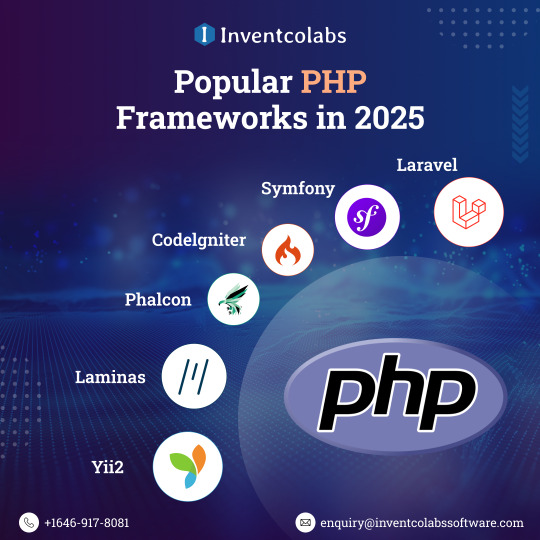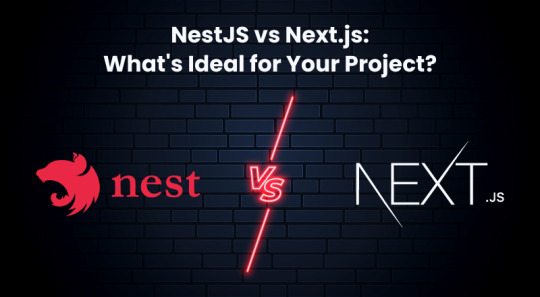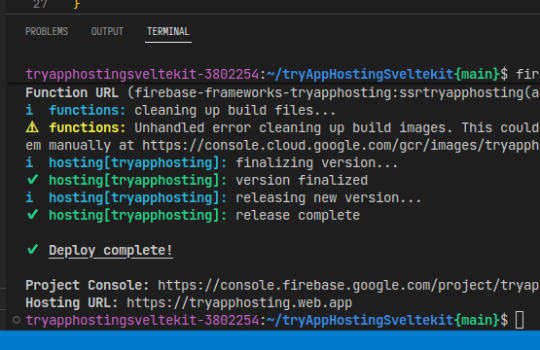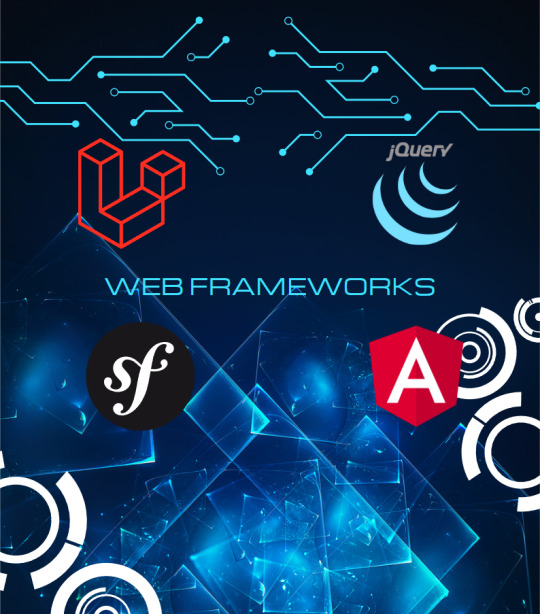#WebFrameworks
Explore tagged Tumblr posts
Text
What are some popular web frameworks for development?
When it comes to creating new websites and online apps, the development framework you use is critical. There are several alternatives to pick from. If you’re not sure where to begin, a popular framework is a good place to start because they’re often tried-and-true solutions.The most popular web frameworks for development are well-liked by both developers and users. This is frequently attributable to the numerous advantages that these frameworks provide. Furthermore, if you choose a well-known framework for your project, you will have easy access to helpful assistance anytime you want it. This post will go over the advantages of using a ‘big name’ web framework for your development job. Then we’ll take a look at 11 of the best possibilities.
To read more click here.
#development#frameworks#frameworksfordevelopment#popular#popularframeworks#webdevelopment#webframeworks
2 notes
·
View notes
Text
What Is MVC Architecture in Full‑Stack Development?
This article explores the MVC (Model‑View‑Controller) design pattern—a foundational architecture in full‑stack web development. It breaks down MVC into three distinct components: the Model (encapsulating data and business logic), the View (handling user interface and presentation), and the Controller (managing user input and orchestrating data flow). The piece outlines how MVC improves code organization, maintainability, testability, and teamwork by enforcing a clean separation of concerns. Examples are drawn from popular web frameworks, illustrating its practical adoption in real‑world full‑stack environments.
#MVC#FullStackDevelopment#WebDevelopment#ModelViewController#SoftwareArchitecture#CodingPatterns#WebFrameworks#ScalableCode#CleanCode#FrontendBackend#TechTutorials
0 notes
Text
Planning a PHP project in 2025? Choose the right framework!
The right PHP framework helps you build faster, safer, and smarter apps. 📌 Top picks for 2025 include: 1️⃣ Laravel – Still the king of modern PHP development with elegant syntax and robust features. 2️⃣ Symfony – A powerful and flexible framework perfect for building scalable enterprise-grade apps. 3️⃣ CodeIgniter – Lightweight and beginner-friendly, ideal for rapid PHP development. 4️⃣ Phalcon – Super fast PHP framework built as a C-extension for maximum speed. 5️⃣ Laminas – Modular and enterprise-ready, designed for high-performance PHP applications. 6️⃣ Yii2 – A secure, efficient, and high-performance framework for professional PHP projects. Stay updated and build smarter with Inventcolabs by your side! For More Visit Us: https://www.inventcolabssoftware.com/php-web-development

#php#phpdevelopment#phpcode#fullstackdevelopment#php programming#webframeworks#web development#techinnovation#techtrends#digitalinnovation
0 notes
Text
Phoenix vs. Other Web Frameworks: A Comparative Analysis
Choosing the right web framework is crucial in web development. A well-chosen framework, like Phoenix, can enhance performance, scalability, and maintainability. Phoenix stands out for real-time applications and high concurrency, thanks to Elixir's robust concurrency model. Comparing Phoenix with frameworks like Django, Ruby on Rails, and Node.js highlights its superior capabilities in handling real-time features and scalability, making it an excellent choice for high-demand web applications.
#WebDevelopment#PhoenixFramework#Elixir#RealTimeApplications#Scalability#WebFrameworks#Django#RubyOnRails#NodeJS#Concurrency
0 notes
Text
#development#frameworks#frameworksfordevelopment#popular#popularframeworks#webdevelopment#webframeworks#gauravgo#gauravgo posts#blog
0 notes
Text
PHP vs. Other Programming Languages: A Comparison for Web Development
In the world of web development, choosing the right programming language is a crucial decision. Among the multitude of options, PHP, Python, Ruby, and JavaScript stand out as prominent players. Each of these languages offers its own set of advantages and use cases. In this article, we'll compare PHP with these languages to help you make an informed choice for your web development projects.
PHP: The Server-Side Scripting Language
PHP (Hypertext Preprocessor) is a server-side scripting language primarily designed for web development. It's known for its simplicity, widespread adoption, and seamless integration with various databases. Here are some key points to consider:
1. Web-Centric Focus: PHP is tailored for web applications and excels in server-side scripting. It's particularly well-suited for content management systems (CMS) like WordPress and e-commerce platforms like Magento.
2. Easy to Learn: PHP is considered one of the easiest languages to learn, making it an excellent choice for beginners in web development.
3. Abundant Resources: The PHP community is vast and has contributed a wealth of libraries, frameworks (e.g., Laravel, Symfony), and extensions to extend its functionality.
4. Database Integration: PHP seamlessly integrates with databases like MySQL, making it a powerful choice for database-driven web applications.
Python: The Versatile Language
Python is renowned for its simplicity, readability, and versatility. While it's a general-purpose language, it has gained significant traction in web development thanks to frameworks like Django and Flask. Here's how Python compares:
1. Readability: Python's syntax is known for its readability, which makes it an excellent choice for developers who value clean and maintainable code.
2. Versatility: Python isn't limited to web development; it's used in various domains, including data science, machine learning, and automation.
3. Rapid Development: Python's frameworks, particularly Django, enable developers to build web applications quickly.
4. Strong Community: Python boasts an active and supportive community, offering an abundance of libraries and resources.
Ruby: The Language Behind Rails
Ruby is known for its elegant and developer-friendly syntax. It powers the Ruby on Rails framework, celebrated for its "convention over configuration" approach. Here's how Ruby stacks up:
1. Rails Framework: Ruby's true strength lies in its web framework, Ruby on Rails, which promotes rapid development and follows best practices.
2. Developer Happiness: Ruby prioritizes developer happiness, emphasizing clean, concise code that's enjoyable to write.
3. Convention Over Configuration: Rails reduces the need for developers to make decisions by providing sensible defaults.
4. Active Community: While not as massive as PHP or Python, the Ruby community is dedicated and passionate about their language.
JavaScript: The Frontend Powerhouse
JavaScript, often referred to as the "language of the web," is the go-to language for frontend web development. Its key attributes include:
1. Frontend Dominance: JavaScript is essential for building interactive and dynamic web interfaces.
2. Full Stack Potential: With the advent of Node.js, JavaScript has extended its reach to server-side development, offering full stack capabilities.
3. Rich Ecosystem: JavaScript has a vast ecosystem of libraries, frameworks (e.g., React, Angular, Vue.js), and packages to enhance web development.
4. Browser Compatibility: JavaScript is supported by all major browsers, ensuring wide accessibility.
In conclusion, the choice between PHP, Python, Ruby, and JavaScript depends on your project's specific requirements and your personal preferences as a developer. PHP is a robust choice for server-side scripting and web-centric applications. Python shines with its readability and versatility. Ruby excels in rapid web development with Rails. JavaScript is indispensable for frontend interactivity and has expanded to the backend with Node.js. Ultimately, the right language for your web development journey will depend on your project goals and development philosophy.
#WebDevelopment#ProgrammingLanguages#PHP#Python#Ruby#JavaScript#WebFrameworks#ComparativeAnalysis#TechComparison#WebDev#CodingLanguages#DevelopmentTools
1 note
·
View note
Text
Are you ready to start building web applications with Python Flask? Whether you're a beginner or looking to expand your Python skills, you've come to the right place! This free course by Asad Mukhtar will guide you through the entire Flask installation process, setting up your environment, and getting your first Flask app up and running.
#Python#Flask#WebDevelopment#BackendDevelopment#FlaskCourse#PythonFlask#TechEducation#FlaskTutorial#PythonWebDevelopment#TechBooks#WebDevelopmentCourse#FlaskAppDevelopment#FlaskForBeginners#FlaskProjects#PythonProgramming#FlaskAPI#WebFramework#TechLearning#PythonWebApp#FlaskDevelopment#FullStackDevelopment#PythonFlaskTutorial#BackendWebDevelopment#PythonFlaskTips#WebDevelopmentSkills
0 notes
Text
Nestjs vs Nextjs: A Comprehensive Comparison for Developers

When it comes to web development, selecting the appropriate framework is crucial. Nest.js and Next.js are two prominent frameworks, each catering to different development needs. Let’s delve into their technical aspects to help you decide which is right for your project.
Nest.js is a progressive Node.js framework designed for building efficient, scalable, and maintainable server-side applications. Utilizing TypeScript, Nest.js ensures strong typing and modern JavaScript features, which enhance code quality and developer productivity. Its modular architecture facilitates the organization of code into easily manageable modules, making it ideal for enterprise-level applications. Nest.js supports a variety of libraries and tools, including TypeORM for database management and Passport.js for authentication, making it a robust choice for complex backend systems.
On the flip side, Next.js is a React-based framework perfect for building server-rendered or statically generated web applications. Known for its exceptional SEO capabilities, Next.js offers features like automatic static optimization, dynamic routing, and API routes. Recent advancements in static site generation (SSG) and incremental static regeneration (ISR) enable developers to create high-performance websites that provide excellent user experiences. Next.js also simplifies full-stack development by allowing API routes within the same project.
In conclusion, if your project requires a sophisticated backend with extensive APIs, Nest.js is the optimal choice. For projects emphasizing frontend performance and SEO, Next.js is unparalleled. Explore more about these frameworks and make an informed decision for your next development project on our blog.
Check out our blog for an in-depth comparison of Nest.js and Next.js to determine the best framework for your needs.
1 note
·
View note
Text
This article introduces fundamental web development tools that every developer should be familiar with, streamlining processes and enhancing overall efficiency.
1 note
·
View note
Text

明日のネタバレできた^^ Google製の(?)オンラインVSCode(???)であるProject IDXで、FirebaseのWebFrameworkをデプロイした。 AppHostingではまだSvelteKitは動かせないため。
明日、会場まで無事にたどり着けるかな? ^^ ※片道3時間のやさしい道のり(日帰)
Google I/O Extended 2024 in 高知 - connpass https://gdgshikoku.connpass.com/event/321542/
0 notes
Text

Webframeworks gibts wie Sand am Meer, die Frage ist häufig was ist genau mein Ziel? Will ich attraktive Benutzeroberfläche mit vielen Animationen erreichen oder ein aufwendiges Backend die mir unterschiedliche Daten im Hintergrund berechnet. Jedes Webframework hat Ihre Vor & Nachteile.
#symfony#laravel#webframeworks#jquery#angularjs#html5#javascript#css#django#vuejs#webdesigner#webdesign#responsivewebdesign
0 notes
Text
ASP. Net Vs Laravel: Choose the Right One for Web App Development
ASP. Net or Laravel? Discover the ultimate guide to choosing the right framework for your next project. Partner with a leading web development company to bring your web app vision to life.

#ASPNet#Laravel#WebAppDevelopment#WebDevelopment#WebFrameworks#DotNet#Coding#Programming#SoftwareDevelopment#TechTrends#AppDevelopment
0 notes
Text
#webdevelopement#howtogetstartedwithwebdevelopment#website#html#css#javascript#backend#frontend#python#django#webframeworks
1 note
·
View note
Link
0 notes
Link
Blazor is a new Microsoft web framework that allows developers to write code for browsers in C#. Here is your complete guide to blazor.
#blazor#webtechnology#webframeworks#webapplication#blazorapp#customblazordevelopment#blazordevelopment
0 notes